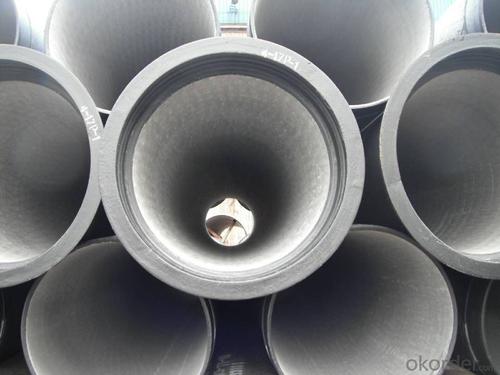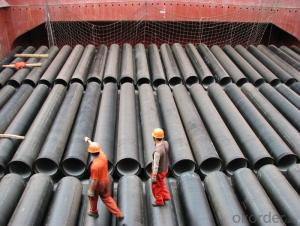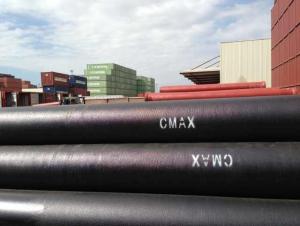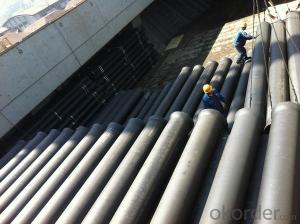DUCTILE IRON PIPE DN450
- Loading Port:
- China Main Port
- Payment Terms:
- TT OR LC
- Min Order Qty:
- -
- Supply Capability:
- -
OKorder Service Pledge
OKorder Financial Service
You Might Also Like
Specification:
1) The standard of pipe: ISO2531:1998, K9
2) Effective length: 6m
3) Inner cement line: Portland cement line as per ISO4179
4) Zinc coating: at least 130g/m2 as per ISO8179
5) Bitumen painting: at least 70um as per ISO8179
6) With 100% quantity of NBR ring, or SBR ring, or EPDM ring as per ISO4633
7) DN80mm-800mm
8) High strength, lighter than grey iron, good corrosion resistance, no furring, small flow resistance, easy fixing, long life tome about 100 yeas
9) Produced by Hangzhou chunfeng machine
10) Checked by automatic inspection equipment
11) Composition:
Chemical composition | |||
Chemical composition | Ductile Cast Iron Pipe (%) | Grey iron pipe (%) | Steel pipe (%) |
C | 3.5-4.0 | 3.2-3.8 | 0.1-0.2 |
Si | 1.9-2.6 | 1.4-2.2 | 0.15-0.4 |
Mn | 0.15-0.45 | 0.4-0.6 | 0.3-0.6 |
P | ≤0.06 | ≤0.3 | 0.02-0.03 |
S | ≤0.02 | ≤0.1 | 0.02-0.03 |
Mg | 0.03-0.06 |
|
|
12) Feature:
Mechanical properties | |||
| Ductile Cast Iron Pipe | Grey Iron Pipe | Steel Pipe |
Tensile Strength(Mpa) | ≥420 | 150-260 | ≥400 |
Yield Strength(Mpa) | ≥300 | No Confirmation | No Confirmation |
Bending Strength(Mpa) | ≥590 | 200-360 | ≥400 |
Elongation (%) | ≥10 | Neglected | ≥18 |
Brinell Hardness(HBS) | ≤230 | ≤230 | About 140 |
13) T type mechanical joint
14) Packing: in bulk or container
- Q: How are ductile iron pipes protected against internal corrosion?
- Ductile iron pipes are protected against internal corrosion through a combination of various preventive measures. One of the primary methods is the application of a protective coating on the inner surface of the pipe. This coating acts as a barrier between the pipe and the transported fluid, preventing direct contact and minimizing the chances of corrosion. Another common method used is the application of a cement mortar lining. This lining further enhances the protective barrier, reducing the likelihood of corrosion even in aggressive environments. The cement mortar also provides a smooth surface, reducing friction and improving the flow of water or other fluids through the pipe. In addition to coatings and linings, ductile iron pipes are often designed with corrosion-resistant alloys or additives. These alloys, such as zinc or epoxy, are added during the manufacturing process and provide an extra layer of protection against internal corrosion. They act as sacrificial anodes, corroding over time to protect the underlying iron from degradation. Regular maintenance and inspection are also crucial in protecting ductile iron pipes against internal corrosion. Monitoring the condition of the protective coatings, identifying any signs of degradation or damage, and promptly addressing any issues are essential to ensure the long-term integrity of the pipes. Overall, a combination of protective coatings, cement mortar linings, corrosion-resistant alloys, and regular maintenance efforts work together to effectively protect ductile iron pipes against internal corrosion, extending their lifespan and ensuring the safe transportation of fluids.
- Q: Are ductile iron pipes resistant to chemical attacks?
- Yes, ductile iron pipes are generally resistant to chemical attacks. Ductile iron is known for its high corrosion resistance, making it suitable for a wide range of applications including water and wastewater systems. Ductile iron pipes are typically lined with a protective coating such as cement mortar or epoxy to further enhance their resistance to chemical attacks. This lining acts as a barrier between the pipe material and the corrosive substances, preventing any degradation of the iron. However, it is important to note that the level of resistance can vary depending on the specific chemical being transported and the concentration and temperature of the solution. Therefore, it is always advisable to consult with experts or engineers to ensure the suitability of ductile iron pipes for specific chemical environments.
- Q: Can ductile iron pipe be used for compressed air systems?
- Indeed, compressed air systems can make use of ductile iron pipe. Ductile iron pipe, renowned for its robustness, endurance, and crack resistance, proves suitable for numerous applications, including compressed air systems. It possesses the capability to endure high pressures and exhibits a lesser tendency to corrode or rust in comparison to alternative materials. Nonetheless, it becomes crucial to guarantee that the ductile iron pipe is adequately sized and installed to accommodate the precise demands of the compressed air system. Furthermore, conducting regular maintenance and inspections becomes imperative to avert any potential problems or damages.
- Q: Can ductile iron pipe be used for irrigation pumping stations?
- Indeed, irrigation pumping stations can utilize ductile iron pipe. This type of pipe finds widespread application, particularly in irrigation systems, owing to its robustness and resilience. Its exceptional tensile strength enables it to endure substantial pressure and weight, rendering it highly suitable for irrigation pumping stations. Furthermore, ductile iron pipe exhibits resistance to corrosion, a desirable trait in the presence of water within irrigation systems. Moreover, its ease of installation and maintenance make it an economical selection for irrigation projects.
- Q: Can ductile iron pipe be used for chemical processing plant applications?
- Yes, ductile iron pipe can be used for chemical processing plant applications. It is durable, corrosion-resistant, and has high tensile strength, making it suitable for transporting various chemicals and fluids in such environments. Additionally, its flexibility and ease of installation make it a practical choice for piping systems in chemical processing plants.
- Q: What are the recommended bedding and backfill materials for ductile iron pipe?
- The recommended bedding and backfill materials for ductile iron pipe include a combination of granular materials such as sand, gravel, or crushed stone. These materials provide support and stability to the pipe, ensuring proper alignment and preventing damage during installation and operation. For bedding, a layer of sand is typically used to create a uniform and level surface for the pipe to rest on. This helps distribute the load evenly along the pipe's length and reduces the potential for stress concentration. Backfill material is used to fill the remaining space around the pipe once it is properly bedded. It is crucial to select a material that offers good compaction and drainage properties to prevent settling and potential damage to the pipe. Commonly used backfill materials include crushed stone or gravel, which provide stability and allow for proper compaction. It is important to follow the recommendations of the pipe manufacturer and any relevant industry standards when selecting bedding and backfill materials for ductile iron pipe. These materials should meet the specified size and quality requirements to ensure the long-term performance and durability of the pipe system. Additionally, local regulations and soil conditions should also be taken into consideration when determining the appropriate bedding and backfill materials for ductile iron pipe installations.
- Q: The difference between spheroidal graphite cast iron pipe and HDPE water supply pipe
- Because the HDPE pipe flexibility is good, in the face of obstacles or trench excavation in straight pipe laying conditions can not directly, but the ductile iron pipe can not, it is sometimes necessary to use the words such as elbow or tube fittings to connect the transition. In this way, the HDPE pipe is superior to the ductile iron pipe in the pipe fittings.
- Q: Are ductile iron pipes suitable for trenchless pipe bursting methods?
- Indeed, ductile iron pipes prove to be an appropriate choice for trenchless pipe bursting techniques. Displaying exceptional strength and durability, ductile iron emerges as a material capable of enduring the formidable forces implicated in the pipe bursting procedure. Its remarkable tensile strength safeguards against the occurrence of cracks or fractures during the bursting process. Moreover, the inner surface of these pipes boasts a smooth texture, which facilitates the efficient flow of fluids such as water. The aforementioned smoothness further diminishes the odds of encountering blockages or accumulation within the pipe. All things considered, ductile iron pipes represent a dependable alternative for trenchless pipe bursting methods.
- Q: What are the advantages of using ductile iron pipe?
- There are several advantages of using ductile iron pipe in various applications. Firstly, ductile iron pipe is known for its exceptional strength and durability. It has a higher tensile strength and yield strength than other types of pipes, making it resistant to cracking, bending, and breaking. This strength allows it to withstand high-pressure and heavy-load conditions, making it ideal for applications such as water and sewage systems, oil and gas pipelines, and industrial piping. Secondly, ductile iron pipe has excellent corrosion resistance. It is coated with a protective layer, usually zinc or epoxy, which prevents rusting and corrosion. This coating ensures a longer lifespan for the pipe, even in harsh environments or when transporting corrosive fluids. Another advantage of ductile iron pipe is its flexibility. Unlike rigid pipes, ductile iron pipes have a certain degree of flexibility, allowing them to withstand ground movement and settle without breaking. This flexibility is particularly beneficial in areas prone to earthquakes or soil settlements. Additionally, ductile iron pipe has a smooth inner surface, which helps to minimize flow resistance and improve the efficiency of fluid transportation. It also reduces the likelihood of sediment buildup or corrosion on the pipe's interior, resulting in improved flow rates and reduced maintenance. Furthermore, ductile iron pipe is cost-effective in the long run. Although it may have a higher initial cost compared to other types of pipes, its durability and low maintenance requirements make it a more cost-effective choice over time. The extended lifespan of ductile iron pipe reduces the need for frequent replacements and repairs, resulting in lower overall life-cycle costs. Lastly, ductile iron pipe is environmentally friendly. It is made from recycled materials, and its long lifespan reduces the need for frequent replacements, thus reducing the carbon footprint associated with manufacturing and transportation. In conclusion, the advantages of using ductile iron pipe include its exceptional strength, corrosion resistance, flexibility, smooth inner surface, cost-effectiveness, and environmental friendliness. These qualities make it a reliable and preferred choice for a wide range of applications in various industries.
- Q: Are ductile iron pipes suitable for gravity flow applications?
- Yes, ductile iron pipes are suitable for gravity flow applications. Ductile iron pipes have high strength and durability, making them ideal for carrying fluids under gravity. They can withstand the pressure and weight of fluid flow without the need for additional support or reinforcement. Additionally, ductile iron pipes have excellent corrosion resistance, which ensures their long-term performance in gravity flow systems.
Send your message to us
DUCTILE IRON PIPE DN450
- Loading Port:
- China Main Port
- Payment Terms:
- TT OR LC
- Min Order Qty:
- -
- Supply Capability:
- -
OKorder Service Pledge
OKorder Financial Service
Similar products
Hot products
Hot Searches
Related keywords



























